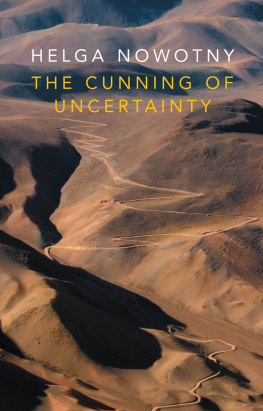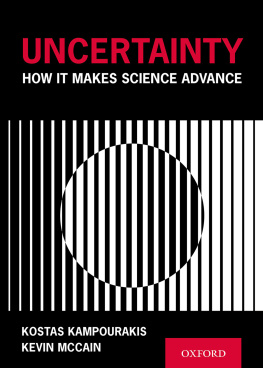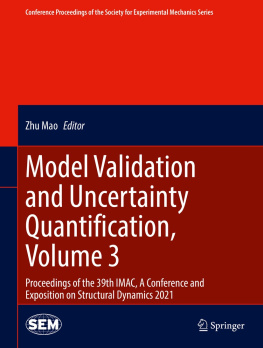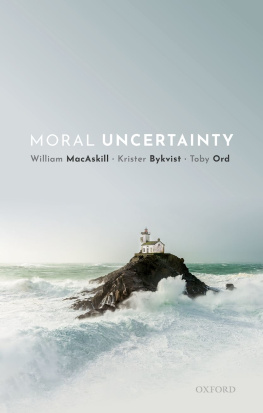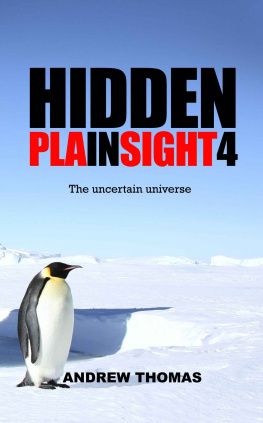
Dedication
For Carlo
Copyright page
Copyright Helga Nowotny 2016
The right of Helga Nowotny to be identified as Author of this Work has been asserted in accordance with the UK Copyright, Designs and Patents Act 1988.
First published in 2016 by Polity Press
Polity Press
65 Bridge Street
Cambridge CB2 1UR, UK
Polity Press
350 Main Street
Malden, MA 02148, USA
All rights reserved. Except for the quotation of short passages for the purpose of criticism and review, no part of this publication may be reproduced, stored in a retrieval system, or transmitted, in any form or by any means, electronic, mechanical, photocopying, recording or otherwise, without the prior permission of the publisher.
ISBN-13: 978-0-7456-8761-2
A catalogue record for this book is available from the British Library.
Library of Congress Cataloging-in-Publication Data
Nowotny, Helga.
The cunning of uncertainty / Helga Nowotny.
pages cm
Includes bibliographical references and index.
ISBN 978-0-7456-8761-2 (hardcover : alk. paper) ISBN 0-7456-8761-X (hardcover : alk. paper) 1. Prediction (Logic) 2. Uncertainty. I. Title.
BC181.N69 2015
121.63dc23
2015012740
Typeset in 10.5 on 12 pt Sabon
by Toppan Best-set Premedia Limited
Printed and bound in the UK by CPI Group (UK) Ltd, Croydon
The publisher has used its best endeavours to ensure that the URLs for external websites referred to in this book are correct and active at the time of going to press. However, the publisher has no responsibility for the websites and can make no guarantee that a site will remain live or that the content is or will remain appropriate.
Every effort has been made to trace all copyright holders, but if any have been inadvertently overlooked the publisher will be pleased to include any necessary credits in any subsequent reprint or edition.
For further information on Polity, visit our website:
politybooks.com
Preface: It Could be Otherwise
This book is about uncertainty, but not only about uncertainty. Uncertainty is inextricably enmeshed with human existence. Even death, our only certainty, is mitigated by the uncertainty of when it will occur. The arrow of time continues to advance the tenuous balance between the punctuated, incomplete and biased knowledge of the past and the uncertainty of what the future will bring.
The future is the ultimate inexhaustible reservoir of uncertainty for the inhabitants of this planet. Notions and imaginaries of the future continue to change. Currently, it appears as fragile and fragmented, as a plural and contradictory mixture of desired and feared imaginations. Ever since modern societies manifested an unprecedented preference for generating novelty, the future became an open horizon with science and technology at the forefront, pushing further into the unknown. Yet what is exciting for some feels threatening to others. Innovation, to use this ubiquitous term, remains a double-edged sword.
Uncertainty is also a powerful incentive in the striving for more knowledge. This includes more effective ways for predicting the future. From the consultation of oracles to the latest charts and graphs as the visualization of the enormous amount of data analytics available today, humans are eager to anticipate what lies ahead. But widening and deepening the knowledge base means more. It enables greater certainty in orientation and practical intervention when confronted with numerous uncertainties. The rise of modern science and technology has led to the vast improvements of material living conditions that provide the potential to lift the remaining parts of the world population out of poverty. Our scientific-technological civilization has developed enormous capabilities to anticipate risks and to focus on uncertainties. But the more we know, the more we also realize what we do not know as yet.
Uncertainty is an inherent component of the process of research. It resides in the multiple ways of searching for and generating new knowledge. Discovery is open-ended and fundamental research cannot predict what it will find or when. Research is the basis of a powerful and systematic process that seeks to transform uncertainties into certainties, only to be confronted with new uncertainties again. Scientific certainties are carefully couched in the precise terms of the conditions under which they hold. Moreover, they are always preliminary. They can and most likely will be replaced by new knowledge, sidestepped by new certainties. Together with curiosity, the lure of uncertainty and of discovering what was not known before is the driving force in this domain of creative human endeavour. If the belief in progress of science and technology and the possibilities for intervention it opens has never waned in the scientific community, this is not always the case in society. The challenge for science to share the sense of intimate involvement in embracing uncertainty with society of which it is a part, so goes my argument, increases together with the capability of science of confronting uncertainty.
At present, the fissure of how to deal, let alone cope, with uncertainty marks the relationship between science and society. While society, this volatile and hard to grasp assemblage of alternating publics, organized groups in civil society, engaged and dissatisfied citizens and the media, may share some knowledge with experts in making technical judgements, significant differences remain. The line between the prerogative of experts in making technical judgements, including those pertaining to the respective degree of certainty, and the prerogative of non-experts to assess the consequences of those judgements is a fine one to tread (Collins 2014). Between these positions lies the vast range of unintended consequences of human action. It takes us into the realm of complexity in which properties and the behaviour of a system are not determined by its parts, but by their interaction. Seeking to reduce the hidden uncertainties that arise through these interactions will be one of the major tasks ahead. It mutually implicates science and society, as neither can succeed without the other.
Uncertainty is not only embodied and enacted in notions of the future or in the domain of knowledge production. It is a well-known feature of organizational life. Every institution and social organization encounters and needs to cope with uncertainty all the time. In different ways, they are confronted with changes in their environment. They crave for success and efficiency, however defined, and know that they must continue to learn from mistakes and from the ambiguity of their experience. This necessitates adaptation, anticipation, preparedness and even innovation. Depending on their goals and specific organizational forms, available resources, leadership and power relations, institutions seek to reduce uncertainty. They also exploit it for their own purposes and/or accommodate it by a muddling-through approach. These elements overlap and vary.
Uncertainty for institutions, and how to deal with it, comes in different guises. Due to the enduring crisis they unleashed, financial markets have been catapulted into the centre of public scrutiny, outrage and timid attempts at more and tighter regulation. They have been criticized for having been fooled by randomness as they failed to recognize the non-normality of events under their remit. More concretely, they are criticized for having committed the policy error of not distinguishing risk from uncertainty. Thus they largely missed the non-normality that may result in the escalation of uncertainties, leading to potentially catastrophic phase shifts (Haldane 2012). Uncertainties in this peculiar institutional environment offer fascinating glimpses on how simulation models and insights into the dynamics of complex adaptive systems can uncover yet another dimension of the unintended consequences of human action.
Next page
